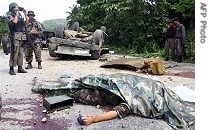-
(单词翻译:双击或拖选)
Thai police say more than 3,500 people have perished in the largely Muslim southern border provinces since the insurgency began.
The first big attack in the insurgency was a raid on an army depot3 on 4 January 2004.
 |
| Thai soldiers inspect ambush4 site in Narathiwat province, 4 Jan 2008 |
The insurgents6 target public officials, teachers, Buddhist7 monks8 and other civilians10. Drive-by shootings occur regularly, there are frequent roadside bombings and many victims are snatched and beheaded.
Human rights groups also accuse the army of rights abuses, including extrajudicial killings12 and forced disappearances13 of suspected militants14. Rights activists15 say the government's reliance on paramilitary groups increases the problem.
But last year, new tactics and increased troop numbers allowed the military to reduce insurgent5 attacks on civilians. Sunai Pasuk, with Human Rights Watch, warns that progress may not last.
"There is no guarantee that this short-term success can be translated into a lasting16 peace at all, because the alienation17 is still out there among ethnic18 Muslims with the authorities," she said. "Suspicion and fear are still the rule on the ground. They do not see Thai authorities as friends - they see Thai authorities as enemies. This feeling remain unchanged."
Thailand's population is overwhelmingly Buddhist, but Muslim communities dominate the three southernmost provinces. They make up one of the poorest areas in the country, and Muslims have long accused the government of discrimination.
Intelligence sources have told VOA that the insurgents, a shadowy collection of groups that have yet to make clear demands, may be shifting tactics. Now they use increasingly sophisticated car bombs.
Human Rights Watch's Sunai says that trend is of particular concern.
"There is now an across the board assessment19 [that] more car bombs will be used this year," she said. "It will be very specific attacks, which will cause rather large numbers of casualties. This is the trend which emerged since the last quarter of 2008, and we fear that the trend will become more permanent in 2009."
For nearly three years, Thailand's political scene has been in upheaval20. The country is on its fifth prime minister since 2006, which means the government has been largely distracted from dealing21 with the insurgency. As a result, the military has largely set policy and planned operations alone.
Prime Minister Abhisit Vejjajiva, who took office last month, vows22 to improve the judicial11 system in the south. But analysts23 say he may face a tough time if the military opposes his goal of increasing civilian9 control in the region and reducing the government's reliance on the military to keep the peace.
 收听单词发音
收听单词发音
1
insurgency

|
|
| n.起义;暴动;叛变 | |
参考例句: |
|
|
|
2
abating

|
|
| 减少( abate的现在分词 ); 减去; 降价; 撤消(诉讼) | |
参考例句: |
|
|
|
3
depot

|
|
| n.仓库,储藏处;公共汽车站;火车站 | |
参考例句: |
|
|
|
4
ambush

|
|
| n.埋伏(地点);伏兵;v.埋伏;伏击 | |
参考例句: |
|
|
|
5
insurgent

|
|
| adj.叛乱的,起事的;n.叛乱分子 | |
参考例句: |
|
|
|
6
insurgents

|
|
| n.起义,暴动,造反( insurgent的名词复数 ) | |
参考例句: |
|
|
|
7
Buddhist

|
|
| adj./n.佛教的,佛教徒 | |
参考例句: |
|
|
|
8
monks

|
|
| n.修道士,僧侣( monk的名词复数 ) | |
参考例句: |
|
|
|
9
civilian

|
|
| adj.平民的,民用的,民众的 | |
参考例句: |
|
|
|
10
civilians

|
|
| 平民,百姓( civilian的名词复数 ); 老百姓 | |
参考例句: |
|
|
|
11
judicial

|
|
| adj.司法的,法庭的,审判的,明断的,公正的 | |
参考例句: |
|
|
|
12
killings

|
|
| 谋杀( killing的名词复数 ); 突然发大财,暴发 | |
参考例句: |
|
|
|
13
disappearances

|
|
| n.消失( disappearance的名词复数 );丢失;失踪;失踪案 | |
参考例句: |
|
|
|
14
militants

|
|
| 激进分子,好斗分子( militant的名词复数 ) | |
参考例句: |
|
|
|
15
activists

|
|
| n.(政治活动的)积极分子,活动家( activist的名词复数 ) | |
参考例句: |
|
|
|
16
lasting

|
|
| adj.永久的,永恒的;vbl.持续,维持 | |
参考例句: |
|
|
|
17
alienation

|
|
| n.疏远;离间;异化 | |
参考例句: |
|
|
|
18
ethnic

|
|
| adj.人种的,种族的,异教徒的 | |
参考例句: |
|
|
|
19
assessment

|
|
| n.评价;评估;对财产的估价,被估定的金额 | |
参考例句: |
|
|
|
20
upheaval

|
|
| n.胀起,(地壳)的隆起;剧变,动乱 | |
参考例句: |
|
|
|
21
dealing

|
|
| n.经商方法,待人态度 | |
参考例句: |
|
|
|
22
vows

|
|
| 誓言( vow的名词复数 ); 郑重宣布,许愿 | |
参考例句: |
|
|
|
23
analysts

|
|
| 分析家,化验员( analyst的名词复数 ) | |
参考例句: |
|
|
|















